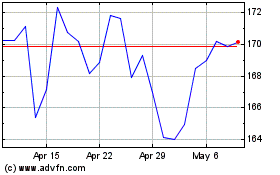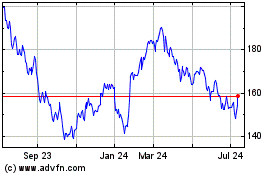LVMH Buys Minority Stake in Stella McCartney House
July 15 2019 - 5:37PM
Dow Jones News
By Noemie Bisserbe and Saabira Chaudhuri
PARIS-- LVMH Möet Hennessy Louis Vuitton bought a minority stake
in the British fashion house set up by Stella McCartney, giving the
French luxury company a high-profile vehicle to tap growing demand
for high-end clothing marketed as sustainable.
Details of the deal, announced by both companies on Monday,
won't be disclosed until September, but LVMH said Ms. McCartney
would retain a majority stake in the company and continue as
creative director. Ms. McCartney will also become a special adviser
to Bernard Arnault, LVMH chairman and chief executive.
According to a person familiar with the matter, LVMH has bought
a stake close to 50% in the Stella McCartney House. A spokesman for
LVMH didn't respond to a request for comment. A representative for
Stella McCartney declined to comment.
Stella McCartney, which has for decades touted its
sustainability credentials, doesn't use leather and fur and
utilizes stainless-steel and aluminum alternatives to brass for
some of its bag chains in an attempt to reduce water pollution
caused by copper mining. Last year, the company launched a
dedicated microsite devoted to telling consumers about its various
sustainability efforts.
The move is an abrupt change of direction for Ms McCartney, who
last year bought out partner Kering SA, LVMH's crosstown archrival,
taking back control of her eponymous brand. Kering had owned a
stake in Stella McCartney since Kering brand Gucci co-founded the
house with Ms. McCartney in 2001. Now, she's back in the fold of
one of the world's fashion conglomerates.
Luxury companies are seeking to appeal to young shoppers
increasingly attuned to sustainability, as well as the ethical
treatment of animals -- which for centuries provided key raw
materials for the fashion trade.
Ms. McCartney was the "first to put sustainability and ethical
issues on the front stage, very early on, and built her House
around these issues, " said Mr. Arnault.
Luxury brands have largely lagged behind their mass-market peers
on such topics. In 2014, fast-fashion giant Hennes & Mauritz AB
launched its first garments made from recycled cotton, while the
company also sells products made from recycled polyamide, wool and
cashmere.
The company in March said it would phase out cashmere products
by 2020 out of environmental and animal-welfare concerns. It has
committed to 100% of the cotton it uses being sustainable by 2020.
Rival Gap Inc. has made the same commitment by 2025.
Meanwhile Zara owner Inditex has said it plans to send no waste
to landfills by 2020 and has rolled out an in-store effort to
collect clothes hangers and security tags so that they are reused,
repaired or recycled. Both H&M and Zara are investing in
recycling technologies so that old clothes can be turned into new
ones.
Still, a May report from Boston Consulting Group and the
nonprofit Global Fashion Agenda criticized the fashion industry for
moving too slowly in its sustainability efforts. It said unless the
current trend improves, the fashion industry would continue to be a
net contributor to climate change. The report cited more than a
third of surveyed consumers as saying they switched from their
preferred brand to another for reasons related social and
environmental responsibility.
Write to Noemie Bisserbe at noemie.bisserbe@wsj.com and Saabira
Chaudhuri at saabira.chaudhuri@wsj.com
(END) Dow Jones Newswires
July 15, 2019 17:22 ET (21:22 GMT)
Copyright (c) 2019 Dow Jones & Company, Inc.
LVMH Moet Hennessy Louis... (PK) (USOTC:LVMUY)
Historical Stock Chart
From Mar 2024 to Apr 2024

LVMH Moet Hennessy Louis... (PK) (USOTC:LVMUY)
Historical Stock Chart
From Apr 2023 to Apr 2024
